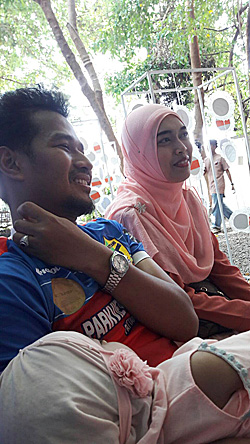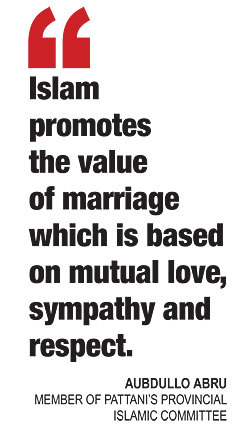
Forced marriages in some families in the deep South, which have left many women suffering in silence, is a perversion of the Muslim religion and victims should speak out, a recent seminar was told.
Two women in Muslim families spoke out about their unhappy marriages at a recent seminar, "Break the Silence", hosted by Oxfam Thailand in Pattani as part of the Violence against Women in Deep South (VAW) project and to mark International Women's Day on March 8.
A video was played in which a young Muslim woman was married off to a middle-aged man from a neighbouring country when she was 10. For 16 years, she has been stuck in a marriage she wants to leave.
She ended up being a second wife of a man she did not love. The woman has lived through episodes of rape, even on her wedding night. The rape continued, especially after the man had a quarrel with his first wife. He took it out on her.

A Muslim couple attends a seminar on domestic violence and hatred against women held recently in Pattani. (Photo by Penchan Charoensuthipan)
"My mum always tried to console me, saying always that a good wife must do what pleases her husband so we will be in paradise (in the after-life). But why is it that I'm feeling like I'm living in hell every day?" she said.
A second video clip shows another girl from the deep South who shares a dark secret about her father she has never told anyone before.
During a peak of the southern unrest, her father told her mother to go out and tap rubber alone, saying women are not the targets of insurgents. While her mother was out working, her father went out to meet another woman he had an affair with.
The stories are a clear illustration of the suffering many women have endured in households with no way out. In some cases, the women are victims of frequent physical and verbal attacks which occur under their own roofs.
Domestic violence in society, including in Muslim families, is commonplace. The problem also exists in the strife-torn Yala, Pattani and Narathiwat at the southernmost border, said Taweeluck Pollachom, the head researcher at the Centre for Excellence in Women and Social Security at the Walailak University.
Many wives go out to work to support their entire families. All these breadwinners get in return is nitpicking questions by jealous husbands about whether they have behaved properly outside the home. That only provokes a quarrel, she said. The "good" wives are expected to obey their husbands whose wishes are their command, she said.
The researcher said some Muslim women desperately wanted to end their unhappy marriages and for good reasons. But they eventually bowed to the pressure exerted by religious leaders who stepped in to mediate. This process tends to favour the husbands who are held to be "right", which emasculates the wives' grounds for seeking a divorce, Ms Taweeluck said.
"The more these women try to keep the problems to themselves, the lonelier they feel. They do need help," said Asst Prof Apinya Wechayachai, a lecturer with Faculty of Social Administration, Thammasat University.
One way to reach out to these victims is to empower women to give them the strength to speak out about the emotional pain they are experiencing. They also need to rethink the old belief they have clung to since a young age that they should not talk openly about the family issue, she said.

Ms Apinya said the Quran contains verses written with an intention to protect women. However, at times, unsophisticated learning of Islam had led to misunderstanding and misinterpretations of the religious principles leading to unfair treatment against women, she said.
Assoc Prof Aubdullo Abru, a member of Pattani's provincial Islamic committee, echoed Ms Apinya's view, saying Islam is a religion that protects women.
In the Islamic context, a marriage is born of a mutual consent between a man and a woman who live together. The man is required to fulfill his promise to protect the woman in the relationship, he said. In case the husband later marries a second wife, he is obligated to treat both wives equally, he said.
Mr Aubdullo, however, admitted that in the event that domestic violence is cited by the wife as a reason to seek a divorce, her request is subject to a reconciliation process aimed primarily at getting her and her husband to settle their differences and restore their happy union.
But if the husband ever harms the wife by means considered highly serious such as being addicted to gambling, the wife is permitted by convention to divorce her husband, he said.
"Islam promotes the value of marriage which is based on mutual love, sympathy and respect," he said. "And if any marriage arrives at a point where living together becomes more like a punishment or distress, then Islam doesn't force them to live with it. They can separate from one another."
He also said "Break the Silence" seminar provided an opportunity to convey one key message to the youths and other sections of society; that citing Islamic teachings to justify domestic violence, rape, and forced marriages was evidence of misinterpretation or a lack of understanding of cherished Islamic principles.
The best course of action to take in easing the problem, according to Mr Aubdullo, is to be supportive of the people who are vulnerable. Also, people should learn about Islamic principles and gain legal knowledge about family issues.
He said he supported the idea of allowing women to have a role in Islamic committees and encouraging them to come together to learn about their rights, and correct Islamic teaching as well as the law.
In most cases, victims of domestic violence only wanted help to stop their abusive husbands from hurting them. However, they have no intention of filing for a divorce, said Rusleena Saleng, a staff member at the centre offering counseling service to women in Narathiwat. The centre is operated by Narathiwat's provincial Islamic committee.
The centre last year received a total of 301 complaints about domestic violence. Ms Rusleena said she believed more women are living in abusive relationships but are afraid to reach out for help. "The women who raised the complaints are the bravest, in my opinion," she said.
The centre is the only place in the province to bring the women to work with Muslim religious leaders in ironing out marriage problems and domestic violence. The centre also helps women gain access to legal aid, she said. It has a counseling unit designed to prepare women for married life by educating them about their rights. This is vital knowledge which women need before tying the knot.